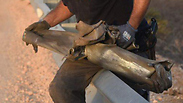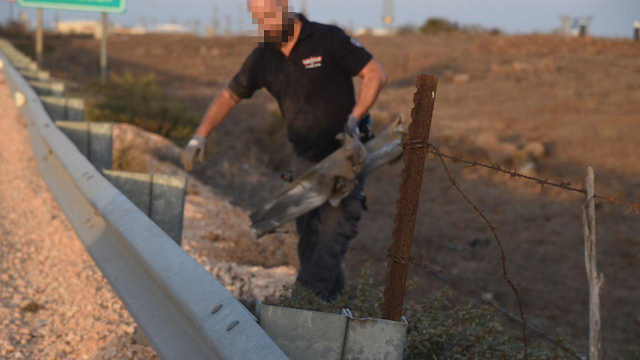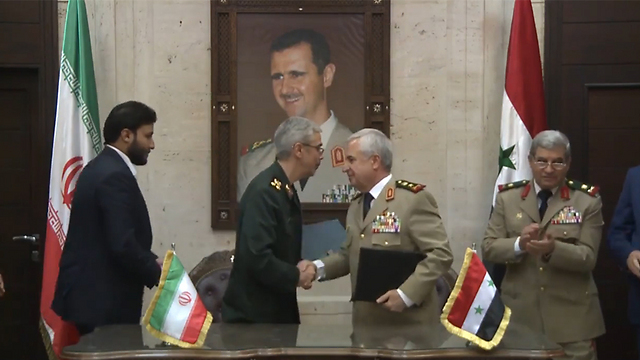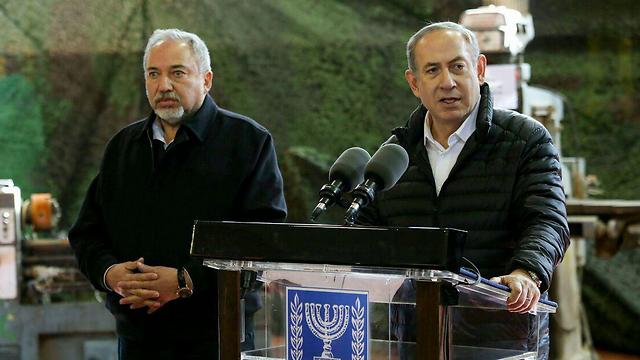
Intentional Syrian fire aimed at deterring Israel without waging war
Analysis: Seeking international and regional legitimization for the Iranian presence in Syria and trying to discourage Israel from carrying out further strikes in Syria, the Iranians and Syrians have launched a diplomatic and military offensive with no intention of escalating the situation on the northern border. Israel is waging its own diplomatic offensive, but Netanyahu and Lieberman’s unnecessary threats are counterproductive.
But the battle Syria and Iran—or Iran and Syria, to be more accurate—are waging against Israel is much wider.
The Iranians would like to achieve two things: One, international and regional legitimization for the Iranian presence and military activity in Syria; and two, to deter Israel from continuing its attacks within Syria, which not only sabotage the Iranian efforts to expand in the country, but also have a negative effect on the Assad regime’s prestige and on his ability to impose his authority in Syria.
The Iranians and the Syrian regime want to achieve these two goals without a war with Israel. An all-out-war, and even an escalation, would interfere with Syrian President Bashar Assad’s plan to regain control of additional areas in Syria and with the Iranians’ plan to pursue their “crawling penetration” into Syria in different military areas and in civil areas as well.
The Iranians are now trying to take over oil fields in Syria and civil rehabilitation activities in a bid to make money. An escalation or a war with Israel would sabotage this activity, which is being carried out primarily by the Revolutionary Guards. The bottom line, therefore, is that Syria and Iran will carry out diplomatic, PR and limited military activity to achieve their goals, but will be careful not to spark a war.
On what levels are the Iranians and Syrians operating? The first level is military: In recent months, the Syrians have made several attempts to intercept IDF planes over Lebanon off Syria's shores in an effort to threaten Israel’s aerial supremacy and freedom. They know the IDF needs aerial freedom of action in Lebanon’s skies, and sometimes over Syria too, for its intelligence gathering activities and to thwart Iranian attempts to supply Hezbollah with precision-guided missiles, in addition to the tens of thousands of statistic missiles the Lebanese organization already has.
The purpose of the Syrian surface-to-air missile batteries locking in on Israel Air Force planes and the SA5 missiles that were fired is to create a deterrence equation vis-à-vis the IAF. The Iranians are hoping to create deterrence indirectly as well through the Russians, who are being dragged—likely unwillingly—into these conflicts in the air. Moscow is being asked to protest to Israel and even to threaten to supply Syria with modern anti-aircraft missile systems.
Another measure is inviting the Iranian military’s chief of staff on an official visit to Syria, that will include the signing military cooperating agreements. This move is highly important as it aims to provide international legal legitimization and diplomatic authorization for the Iranian penetration into Syria.
It’s important to note that the Iranian military’s chief of staff, Mohammad Baqeri, heads an official and internationally recognized Iranian state institution. He is not the Revolutionary Guards commander, but part of the legitimate government in Iran which is led by relatively moderate President Hassan Rouhani.
The Syrians and Iranians are well aware of the fact that the Revolutionary Guards are a subversive organization which US President Donald Trump was about to declare a terror organization. The Revolutionary Guards operate the Shiite militias too, which are also unrecognized and illegitimate organizations in the international arena, and especially in the Middle Eastern arena.
So the person the Iranians sent to Syria is the chief of staff who heads the state army, which was hardly involved in the battles with Sunni rebels in Syria. This dirty work was done by the Revolutionary Guards and the militias for the Assad regime, but now that it’s time to reap the fruit, they are sending the military’s chief of staff to sign agreements with Syria’s official army, in accordance with international conventions.
The purpose of the visit and the agreements signed between the Syrian and Iranian armies is to diplomatically legitimize Iranian penetration into Syria. These agreements are dangerous, however, because they officially and openly allow Iran to transfer weapons and military technologies—like advanced anti-aircraft missiles—to Syria, yet denying Israel the possibility to complain to the Russians and even to the UN that Iran is placing its own weapons in Syria and transferring them to Hezbollah.
In the near future, we are expected to see advanced Iranian weapon systems in Syria, mainly in the anti-aircraft field, which is aimed at limiting the IDF’s aerial freedom of action, and in the field of accurate missiles which the Iranians will allegedly supply the Syrian army with, although they which will actually reach Hezbollah.
The fourth area of the Iranian-Syria offensive is conscious deterrence through psychological warfare against the citizens of the State of Israel. After each incident on the border or airstrike in the north, the Syrians warn that “the Israeli aggression will be met with a serious response” from Syria.
This threat is made time and again in Syrian army statements and on the Syrian media, and its purpose is to create the feeling in Israel that another alleged Israeli attack on an Iranian arms workshop in Syria, and further responses to “spillover” fire in the Golan Heights, will lead to a general flare up. Both the Syrians and the Iranians have no intention of escalating the situation to a war, but they want the Israeli public and media to be concerned and keep worrying that a war is about to happen.
What is Israel doing against Syrian offensive?
Israel is currently waging its own diplomatic offensive. The goal is to reach an American-Russian collaboration that will lead to a long-term arrangement in Syria in which the Iranians will have no military presence, neither on the border with Israel in the Golan Heights nor in more remote air and naval bases on Syrian territory.
The new national security advisor visited Washington last week for that purpose, and then flew directly to Moscow for talks with his Russian counterparts. Defense Minister Avigdor Lieberman is in Washington too right now, following talks with his Russian counterpart Sergey Shoigu last week. And if that were not enough, IDF Chief of Staff Gadi Eisenkot left for Washington on Sunday.
This diplomatic offensive is aimed at getting the Russians and the Americans to cooperate in a bid to neutralize the possibility that Israel would be forced to use military force on a wider scale to prevent an Iranian expansion in Syria. The purpose of the talks between senior Israeli government officials and high-ranking members of the security establishment in Washington, Moscow and Tel Aviv is to prevent a war, without waiving Israel’s red lines:
• Preventing Hezbollah from arming itself with precision-guided missiles and with sophisticated anti-aircraft weapons.
• Preventing rocket fire and ground attacks on Israeli territory in the Golan Heights.
• Preventing Syrian use of chemical weapons.
• Preventing an Iranian expansion near the Golan border to avoid a situation in which, in case of a war, the Iranians will operate against Israel from Syrian territory while Hezbollah operates against us from Lebanese territory. The Iranians and Hezbollah are interested in turning the north into one front.
Israel won’t give up its aerial freedom of action in the northern skies either. Israel is rightfully insisting on these red lines, with considerable success, through the confidential and non-confidential “war between wars” the IDF is waging in the north.
The harmful and less successful part is Defense Minister Lieberman and Prime Minister Netanyahu's frequent public statements on the Iranian and Syrian issue. Up until now, Israel knew how to act without talking, but for the past six months the defense minister has been releasing unnecessary threats in every direction.
If we attacked Syrian army posts, which were the source of spillover fire in the Golan Heights, Damascus got the hint. There is no need to add a series of threats that only prevent the Syrians from quietly fixing what needs fixing and, at the end of the day, force them to engage in provocations in an attempt to prevent further harm to the regime’s prestige.
The prime minister is exercising the same unnecessary noisy public diplomacy. The Russians and the Americans, whose help we are seeking in neutralizing the Iranians in Syria, are in no need of empty bombastic declarations in the media. They are receiving the Israeli messages directly from the prime minister, the defense minister, the national security advisor and the chief of staff, and don’t need public threats which only require the Russians to demonstrate that they are helping their proteges and providing them with a diplomatic umbrella and sophisticated weapons.
Lieberman and Netanyahu's statements are achieving the opposite of the desirable outcome for the State of Israel and its citizens.













